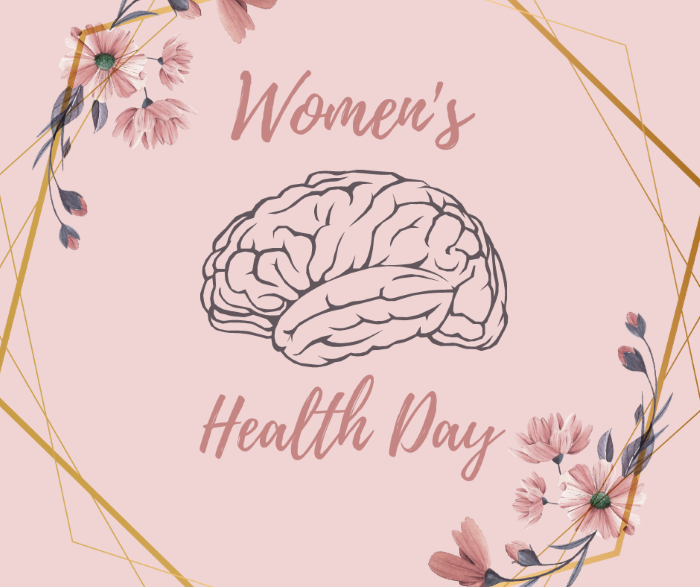Women's Brain Health Day
By Eqra Jan, Michaela Karam, & Rita Gill (Get Well Clinic)

December 2nd, 2021 marks the third annual Women’s Brain Health Day, having first been officially recognized by the Government of Canada in 2019.
Women’s brain health is an especially important and relevant topic due to the fact that many brain health conditions occur more often in women than in men. For example, women are twice as likely to suffer from depression, strokes, and dementia (Women’s Brain Health Initiative, 2021).
Mood Disorders
Women suffer from more severe depression and anxiety disorders compared to men (Science Daily, 2019; Hanamsagar, & Bilbo, 2015).
Stroke
Although women have a lower incidence of stroke than men do, they are more likely to die as a result of a stroke, suffer from poorer outcomes as they recover, and have a steeper decline in functioning after a stroke (Hanamsagar, & Bilbo, 2015; Women’s Brain Health Initiative, 2020).
Dementia
Alzheimer’s disease, which is the most common cause of dementia, seems to disproportionately affect women, with 70% of Alzheimer’s patients being women (Women’s Brain Health Initiative, 2021).
Migraines
Women are three times as likely to suffer from migraines (including menstrual migraines) and experience more severe symptoms (Premier Neurology & Wellness Center, 2021).
Concussions
Women’s recovery time from concussions is longer than men and they also suffer from more severe symptoms (Women’s Brain Health Initiative, 2020).
Multiple Sclerosis
Women are diagnosed with multiple sclerosis (MS) at 4x the rate of men. As well, an increasing number of women are developing the disease (Women’s Brain Health Initiative, 2020), although it is more prevalent in northern latitude countries/ethnicities and those of European descent. During childbearing years, relapsing-remitting MS is 3x more common in women. Meanwhile, primary progressive MS generally occurs equally in both men and women but typically, symptoms show up in women approximately 5 years earlier than in men (Premier Neurology & Wellness Center, 2021).
Parkinson’s
Although men are more likely to get PD, women can also be affected by the disease in that they are often misdiagnosed since doctors are less likely to associate symptoms in women with PD and they are consequently diagnosed later than men (Premier Neurology & Wellness Center, 2021).
Sex differences have been largely attributed to the direct and indirect effects of steroid sex hormones (Hanamsagar, & Bilbo, 2015). The specific causes for the sex differences in disease progression are not fully understood. However, a strong link has been found between the different inflammation states in the two sexes and their disease development and progression (Hanamsagar, & Bilbo, 2015).
How to Keep Your Brain Healthy
Exercise Regularly
Aim to: Move your body several times a week for 30-60 minutes, although as little as 15 minutes a day can make a difference (Dexter, 2020; Larson, 2021).
Any moderate aerobic activity that increases one’s heart rate (that can include walking, swimming, or playing tennis) is beneficial, although some studies suggest that exercising one’s leg muscles may provide the most benefit (Dexter, 2020; Science Daily, 2019). This is because the brain receives signals that help make new cells when working your leg muscles (Cohen, 2019).
Why? Regular physical activity seems to prevent or postpone declines in mental function, decreasing one’s risk of developing Alzheimer’s disease and other dementias (Larson, 2021; Dexter, 2020).
Exercising increases blood flow to the brain and can increase the size of the hippocampus, the brain’s crucial memory center, which naturally shrinks as a result of aging (Cohen, 2019; Dexter, 2020). It also has the ability to counter some natural reduction in brain connections that play a role in some of the problems we see with aging (Dexter, 2020).
Avoid/Quit Smoking
Aim to: If you currently smoke, consider quitting. You can discuss methods to help quit with your doctor.
Why? Tobacco can have several negative effects on your brain, and stopping smoking can help improve one’s chances for healthier brain function (Larson, 2021).
Eat Well and Avoid High-Sugar Foods
Aim to: Avoid highly processed, sugary foods such as soda and candy to help maintain a balanced diet (Larson, 2021). But if you're looking for something sweet, treat yourself to some dark chocolate! Dark chocolate has been suggested to help boost your memory and cognition (Cohen, 2019). Also, have your coffee in the right dose (1-2 cups) earlier in the day. This can also help reduce the risk of cognitive decline and help you focus better (Cohen, 2019).
Why? High blood sugar from high-sugar diets can increase one’s risk for dementia (Larson, 2021). Meanwhile, diets rich in omega-3 fatty acids and low in saturated fat, such as the Mediterranean diet (which consists of mainly fish, fruits, vegetables, whole grains, nuts, and olive oil, with little red meat) and the MIND diet (which has an extra emphasis on leafy greens and berries) can help boost your focus and reduce your risk of Alzheimer’s (Cohen, 2019; Dexter, 2020).
Consume Moderate to no Alcohol
Aim to: Consume no more than 1 alcoholic drink per day (Larson, 2021).
Why? As we get older, drinking has a larger effect on our brain (Larson, 2021).
Minimize Stress
Aim to: Learn good coping skills to help deal with stress and anxiety (Larson, 2021).
Why? When you experience chronic stress, the hormones that are released in response to stress can contribute to reduced hippocampal volume, which is more commonly observed in depressed individuals (The Conversation, 2020). Furthermore, these stress hormones have a stronger effect on our brains as we age, making it more difficult to recover from emotional distress (Larson, 2021).
Sleep Well
Aim to: Get 7-9 hours of quality sleep each night (Cohen, 2019). The method used to achieve quality sleep is important too. Some good practices include reducing screen time at night, meditating, and jotting down any lingering thoughts or to-do’s for the next day. Talk to your doctor before using sleep medications (Larson, 2021).
Why? Inadequate sleep has been linked to a higher risk of dementia (Larson, 2021). Sleep may help to clear detrimental proteins in the brain linked to Alzheimer’s disease, and can promote better memory and sharper thinking (Cohen, 2019; Dexter, 2020).
Remain Socially Involved
Aim to: Look for opportunities to spend time with others rather than scrolling through social media (Cohen, 2019).
Why? Studies link solitary confinement to brain atrophy, while social interaction has been linked to a healthier brain, helping deflect depression and stress that can negatively affect memory or hamper the brain’s ability to do useful things like learning (Dexter, 2020; Cohen, 2019).
Get Mental Stimulation
Aim to: Challenge your brain by reading and doing different types of puzzles, and avoid largely passive activities such as watching a lot of television (Dexter, 2020).
Why? Your brain is like a muscle, and using it, especially in different ways, helps keep it the healthiest it can be (Dexter, 2020).
Keep Your Heart Healthy
Aim to: Maintain a healthy, active lifestyle (Cohen, 2019).
Why? Having a healthy brain largely relies on having a healthy cardiovascular system. Moving your body helps maintain blood flow to the brain, preventing plaque buildup in arteries and blood clots that can be damaging to the brain (Cohen, 2019). Consult your doctor if you have diabetes, high blood pressure, high cholesterol, or atrial fibrillation (Larson, 2021). These all impede blood flow to the brain, which can contribute to neurodegenerative disease (Cohen, 2019).
Try New Things
Aim to: Build new skills throughout your lifetime! (Cohen, 2019)
Why? Challenging your brain essentially creates a backup system by building more circuits in your brain. These increased circuits help prevent changes associated with neurodegenerative disease (Cohen, 2019).
Despite the unnerving statistics, most research on these diseases focus on the symptoms, progression, and treatment in men (Women’s Brain Health Initiative, 2020). And, despite the limited medical research about women, sex is rarely a factor considered when deciding treatment options (Hanamsagar, & Bilbo, 2015). Moving forward, we should strive towards sex equaltiy in resesarch.
References:
Cohen, M. (2019). How to Keep Your Brain Fit.
Dexter, D. (2020). 5 tips to keep your brain healthy.
Larson, E.B. (2021). Keep your brain healthy as you age.
Premier Neurology & Wellness Center. (2021). 6 Neurological Conditions that Affect Women Differently than Men.
Women’s Brain Health Initiative. (2020). Toronto sign will be lit purple in honour of Women’s Brain Health Day in Canada.
Women’s Brain Health Initiative. (2021). Learn About Our Mission.
Hanamsagar, R. & Bilbo, S.D. (2015). Sex differences in neurodevelopmental and neurodegenerative disorders: Focus on microglial function and neuroinflammation during development.
Science Daily. (2019). Women twice as likely to suffer from severe depression after a stroke.
The Conversation. (2020). How chronic stress changes the brain - and what you can do to reverse the damage.



